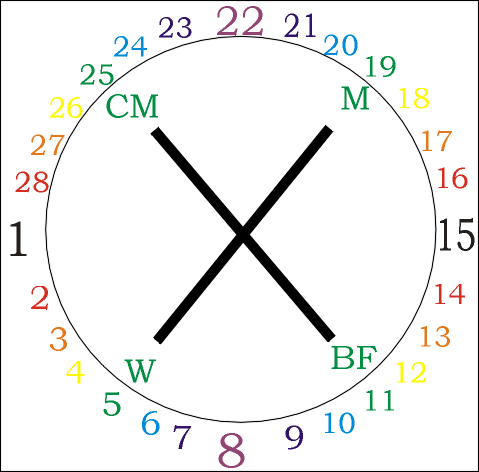
F: Domination
F: Spiritual arrogance
5 FCM
25 TM
| The attributes of the Faculties when Will is at Phase 5 | derived from | modified by | from | description | ||
| Will | Separation from innocence | 5 | ||||
| Mask | True | Excess | 19 | BF | 25 | Enforced failure of action |
| False | Limitation | CM | 11 | Emotional intellect | ||
| Creative Mind | True | Social intellect | 25 | BF | 19 | Persecution |
| False | Limitation | FCM | 5 | Spiritual arrogance | ||
| Body of Fate | Natural law | 11 | ||||
| Composite of Faculties | |
|---|---|
| true | Separation from innocence seeks to deliver social intellect, modified by persecution, from excess, modified by enforced failure of action, with the help of natural law. |
| false | Separation from innocence is misdirected to limitation, modified by spiritual arrogance, bringing limitation, modified by emotional intellect, separated from natural law. |
 | Attributes of Phase 5 | affects | modifies | |
| Will | Separation from innocence | 5 | - | |
| Mask | T:
Conviction
F: Domination | 19 | - | |
| Creative Mind | T:
Rhetoric
F: Spiritual arrogance | 25 | 11 TM 5 FCM | |
| Body of Fate | Enforced belief | 11 | 19 FCM 25 TM | |
See AV B 112-13 & 96.
Byron�s Don Juan or Giaour
Yeats�s description of the phase from A Vision |
|
Out of phase, and seeking antithetical emotion, he is sterile, passing from one insincere attitude to another, moving through a round of moral images torn from their context and so without meaning. He is so proud of each separation from experience that he becomes a sort of angry or smiling Punch with a lath between his wooden arms striking here and there. His Body of Fate is enforced, for he has reversed the condition of his phase and finds himself at conflict with a world which offers him nothing but temptation and affront. True to phase, he is the direct opposite of all this. Abstraction has indeed begun, but it comes to him as a portion of experience cut off from everything but itself and therefore fitted to be the object of reflection. He no longer touches, eats, drinks, thinks and feels Nature, but sees her as something from which he is separating himself, something that he may dominate, though only for a moment and by some fragmentary violence of sensation or of thought. Nature may seem half gone, but the laws of Nature have appeared and he can change her rhythms and her seasons by his knowledge. He lives in the moment but with an intensity Phases 2, 3 and 4 have never known, the Will approaches its climax, he is no longer like a man but half-awakened. He is a corrupter, disturber, wanderer, a founder of sects and peoples, and works with extravagant energy, and his reward is but to live in its glare. Seen by a poet of the opposite phase, by a man hiding fading emotion under broken emphasis, he is Byron's Don Juan or his Giaour. (AV B 112-13) |
See a broader view of the Phase in the consideration of the Phase Triads.